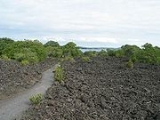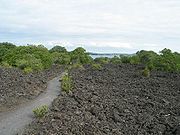
Primary succession
Encyclopedia

Ecological succession
Ecological succession, is the phenomenon or process by which a community progressively transforms itself until a stable community is formed. It is a fundamental concept in ecology, and refers to more or less predictable and orderly changes in the composition or structure of an ecological community...
of plant life, occurring in an environment in which new substrate
Stratum
In geology and related fields, a stratum is a layer of sedimentary rock or soil with internally consistent characteristics that distinguish it from other layers...
devoid of vegetation and usually lacking soil, such as a lava flow or area left from retreated glacier
Glacier
A glacier is a large persistent body of ice that forms where the accumulation of snow exceeds its ablation over many years, often centuries. At least 0.1 km² in area and 50 m thick, but often much larger, a glacier slowly deforms and flows due to stresses induced by its weight...
, is deposited. In other words, it is the gradual growth of an ecosystem over a longer period of time.
In contrast, secondary succession
Secondary succession
Secondary succession is one of the two types of ecological succession of plant life. As opposed to the first, primary succession, secondary succession is a process started by an event that reduces an already established ecosystem Secondary succession is one of the two types of ecological...
occurs on substrate that previously supported vegetation before an ecological disturbance such as forest fire, tsunami
Tsunami
A tsunami is a series of water waves caused by the displacement of a large volume of a body of water, typically an ocean or a large lake...
, flood
Flood
A flood is an overflow of an expanse of water that submerges land. The EU Floods directive defines a flood as a temporary covering by water of land not normally covered by water...
, destroyed the plant life.
Definition
In primary succession pioneer speciesPioneer species
Pioneer species are species which colonize previously uncolonized land, usually leading to ecological succession. They are the first organisms to start the chain of events leading to a livable biosphere or ecosystem...
like lichen
Lichen
Lichens are composite organisms consisting of a symbiotic organism composed of a fungus with a photosynthetic partner , usually either a green alga or cyanobacterium...
, algae and fungus as well as other abiotic factors like wind and water start to "normalize" the habitat
Habitat (ecology)
A habitat is an ecological or environmental area that is inhabited by a particular species of animal, plant or other type of organism...
. This creating conditions nearer optimum for vascular plant growth; pedogenesis
Pedogenesis
Pedogenesis is the science and study of the processes that lead to the formation of soil ' and first explored by the Russian geologist Vasily Dokuchaev , the so called grandfather of soil science, who determined that soil formed over time as a consequence of...
or the formation of soil is the most important process.
These pioneer plants are then dominated and often replaced by plants better adapted to less odd conditions, these plants include vascular plants like grasses and some shrubs that are able to live in thin soils that are often mineral based.
For example, spores of lichen or fungus, being the pioneer species, are spread onto a land of rocks. Then, the rocks are broken down into smaller pieces and organic matter gradually accumulates, favouring the growth of larger plants like grasses, ferns
Fern
A fern is any one of a group of about 12,000 species of plants belonging to the botanical group known as Pteridophyta. Unlike mosses, they have xylem and phloem . They have stems, leaves, and roots like other vascular plants...
and herbs. These plants further improve the habitat and help the adaptation of larger vascular plants like shrubs, or even medium- or large-sized trees. More animals are then attracted to the place and finally a climax community
Climax community
In ecology, a climax community, or climatic climax community, is a biological community of plants and animals which, through the process of ecological succession — the development of vegetation in an area over time — has reached a steady state. This equilibrium occurs because the climax community...
is reached.
Examples
A good example of primary succession takes place after a volcanoVolcano
2. Bedrock3. Conduit 4. Base5. Sill6. Dike7. Layers of ash emitted by the volcano8. Flank| 9. Layers of lava emitted by the volcano10. Throat11. Parasitic cone12. Lava flow13. Vent14. Crater15...
has erupted. The resulting barren land is first colonized by pioneer plants which pave the way for later, less hardy plants, such as hardwood tree
Hardwood
Hardwood is wood from angiosperm trees . It may also be used for those trees themselves: these are usually broad-leaved; in temperate and boreal latitudes they are mostly deciduous, but in tropics and subtropics mostly evergreen.Hardwood contrasts with softwood...
s, by facilitating pedogenesis
Pedogenesis
Pedogenesis is the science and study of the processes that lead to the formation of soil ' and first explored by the Russian geologist Vasily Dokuchaev , the so called grandfather of soil science, who determined that soil formed over time as a consequence of...
, especially through the biotic acceleration of weathering
Weathering
Weathering is the breaking down of rocks, soils and minerals as well as artificial materials through contact with the Earth's atmosphere, biota and waters...
and the addition of organic debris to the surface regolith
Regolith
Regolith is a layer of loose, heterogeneous material covering solid rock. It includes dust, soil, broken rock, and other related materials and is present on Earth, the Moon, some asteroids, and other terrestrial planets and moons.-Etymology:...
.
See also
- Secondary successionSecondary successionSecondary succession is one of the two types of ecological succession of plant life. As opposed to the first, primary succession, secondary succession is a process started by an event that reduces an already established ecosystem Secondary succession is one of the two types of ecological...
- Ecological successionEcological successionEcological succession, is the phenomenon or process by which a community progressively transforms itself until a stable community is formed. It is a fundamental concept in ecology, and refers to more or less predictable and orderly changes in the composition or structure of an ecological community...
- Pioneer speciesPioneer speciesPioneer species are species which colonize previously uncolonized land, usually leading to ecological succession. They are the first organisms to start the chain of events leading to a livable biosphere or ecosystem...
- Soil creation
- Stability (ecology)

